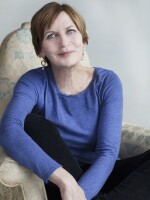TERRY GROSS, HOST:
This is FRESH AIR. In this season of witches, a new book by Pulitzer Prize-winning author Stacy Schiff re-examines the most famous witches tale of them all. Book critic Maureen Corrigan has a review of "The Witches."
MAUREEN CORRIGAN, BYLINE: It's our national campfire story, the Salem witch hunts, of course. Specifically the nine months in 1692 when the town of Salem and surrounding areas spiked into a code-red-terror-alert mode. By the time the Salem villagers came to their senses or grew exhausted or expelled the witches - take your pick of interpretations - 19 people, women and men, had been hanged. In addition, one stubborn old man, a suspected wizard who refused to participate in his own trial, was pressed to death with heavy stones while several more accused witches died in prison and two demonic dogs were executed. Almost immediately after the witch hunts happened, Salem did its best to forget them. No official records of any of the sessions of the witchcraft court survived. Salem diaries of the time are mum on the months of mid-1692. But no matter how deep Salem tried to bury the story, generations of scholars, writers and thrill seekers keep scrabbling at it. Think only of all those high school productions of Arthur Miller's "The Crucible" that get mounted every year. Now along comes Stacy Schiff exhuming the witch hunts once again in her eerie and engrossing new book, "The Witches." Schiff and Salem are well met. As a popular historical writer, Schiff is a proven spellbinder. She seems to have digested all the available contemporary writings about the witch hunts as well as more recent scholarship. Unlike, say, historian Mary Beth Norton's superb 2002 book, "In The Devil's Snare," built on her crucial insight that many of the alleged victims of witchcraft were also traumatized survivors of the Indian wars that ravaged the area, "The Witches" isn't fueled by one central hunch. Instead, Schiff, like a broomstick jockey flying through the night sky, surveys the whole panoramic expanse of Salem - the ministers and the odd women easily targeted as witches, the intransigent judges and the tavern owners and jail keeps who made a killing on the phenomenon of the witch trials. As you might expect from a writer whose last book focused on that mistress of intrigue Cleopatra, Schiff lingers longest over the bewitched accusers - most of them teenaged girls, the most vocal of whom were servants. Schiff suggests that these girls, who ordinarily wouldn't have captured the ear of powerful men, expressed in fits what they could not communicate in words. She spells out what's often left implicit about Salem, that it's one of the few episodes in American history when women, particularly young women, play the central role. Schiff herself is most commanding when she conjures up her storyteller's art to evoke the world of Salem and particularly the bitter winter of 1692 in that paranoid village perched on the edge of a fairytale dark wilderness. When the accused witch, an Indian slave Tituba, electrified the court with her testimony of a devil accompanied by a yellow bird, red cats and flying knives, it was the dreariest season of the year. Accusers and accused, with their lure tales of witch cakes, poppets, magical green ointments and other wonders of the invisible world, supplied color and distraction from the endless Puritan round of work. By summertime, as the storm of accusations exhausted itself, Schiff says that everyone in the area now knew an accused witch. In the free-for-all, men accused women, girls their elders, children their mothers. The accused ranged in age from 7 to 80. And Schiff does her best, despite the scarcity of contemporary accounts, to bring the personalities of the accused, and particularly the condemned, to vivid life again. In the haunting opening of "The Witches," Schiff announces her intention to moodily summon up rather than to solve the mystery of Salem. She says (reading) Salem represents one of the rare moments in our enlightened past when the candles are knocked out and everyone seems to be groping about in the dark, the place where all good stories begin. Indeed they do. In "The Witches," Schiff may not lead us out of the dark, but she makes it an inviting place to linger a while and listen to fresh details of a familiar story all over again.
GROSS: Maureen Corrigan teaches literature at Georgetown University. She reviewed "The Witches" by Stacy Schiff. Tomorrow on FRESH AIR...
(SOUNDBITE OF FILM, "SPOTLIGHT")
UNIDENTIFIED ACTOR: (As character) Show me the church manipulated the system so that these guys wouldn't have to face charges.
GROSS: We'll talk about the new film "Spotlight," a drama set in 2001 about the Boston Globe journalists who investigated priests who had molested children and how the church protected the priests. Our guests will be Tom McCarthy, who directed the film, and Walter Robinson, one of the Globe reporters. He's played in the film by Michael Keaton. I hope you'll join us. Transcript provided by NPR, Copyright NPR.
NPR transcripts are created on a rush deadline by an NPR contractor. This text may not be in its final form and may be updated or revised in the future. Accuracy and availability may vary. The authoritative record of NPR’s programming is the audio record.


